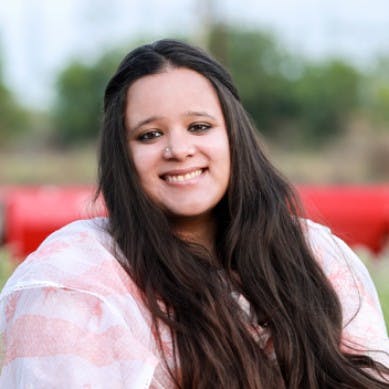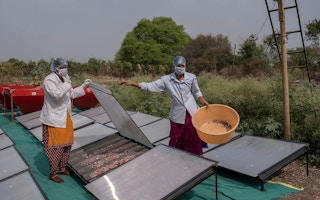When staff at S4S Technologies first presented a food drying set-up powered just by the sun’s heat to rural farmers in India 10 years ago, the response was mixed.
Smallholder farmers had reservations despite promises that the apparatus could boost their income by preventing up to 40 per cent of fresh harvests from going bad before they could be sold. The issue, the team realised, was on the business front.
“The farmers couldn’t find markets for fresh produce, let alone dehydrated produce,” 29-year-old Nidhi Pant, co-founder of S4S Technologies, recalled.
So in 2019, the start-up started offering to buy the dried goods smallholder farmers made using the dehydration devices – fruits, vegetables, pulses and spices – before consolidating the produce and selling it to larger food businesses. It also helped women farmers access bank loans to manage upfront costs.
The venture soon took off. The firm, established by a group of university friends, managed to raise millions of dollars via funding rounds in 2020 and 2022 with investors local and abroad. It now has 120 staff and mainly operates in three Indian states of Odisha, Andhra Pradesh and Maharashtra.
This month, it scored a £1 million (US$1.25 million, ₹10.3 crore) grant via the British royalty-backed Earthshot Prize, under the “waste-free world” category. By S4S Technologies’ estimate, it has helped about 100,000 women smallholders increase profits by up to 15 per cent through selling dried goods. It wants to reach three million farmers by 2025, and in the year after, reduce food waste by a total of 1.2 million tonnes.

Nidhi Pant, 29, is a co-founder of S4S Technologies, one of the 2023 winners of UK’s Earthshot Prize. Image: LinkedIn/ Nidhi Pant.
S4S Technologies also has support from groups such as the United States’ development agency USAid and the impact investing arm of Singapore bank DBS, while its clients include French food services giant Sodexo, Indian cloud kitchen operator Faasos and Air India’s caterer Ambassador’s Sky Chef.
“S4S, along with women farmers, are creating a new food ecosystem that reduces wastage and mitigates the increase in greenhouse gas emissions while meeting the world’s food needs,” Pant said after the Earthshot Prize win.
Eco-Business caught up with her to ask more about climate impacts on farmers, S4S Technologies’ recipe for success, and the company’s next steps.
How will S4S Technologies use the £1 million (US$1.25 million, ₹10.3 crore) grant from the Earthshot Prize?
The Earthshot Prize is a great platform for us to showcase the work of our farmers on a global stage.
We are using the prize money for three major things. One is to onboard more farmers and entrepreneurs onto our platform. Second is to do more research and development on new products – categories such as tea, coffee, milk and spcies. Third is to provide digital access to farmers on information to be more climate resilient.
How does your business model work – it is not just providing farmers the solar dryer right?
Our business model is to provide everything that the farmers need for food processing to happen at the farm gate, through our technology [the solar dryer]. We work with banks to provide farmers with the affordable financing needed to buy the technology.
Women farmers we work with are new to crediting; they don’t have a bank history and would normally not be able to get loans because of that. But since we guarantee a buy-back of the farmers’ goods, the banks know these women have viable businesses, cash flows and an assured market, so they are able to get loans.
The cost of our dryer is ₹2 lakh (U$2,400). The farmers usually take an individual loan for five to seven years, with an interest rate of about 6 per cent. They can break even within a year, but generally they repay the loan across the seven years to keep more of their earnings in the short run.
With the market linkage, the solar dryer becomes of greater use to the farmers – they can now sell their produce to large food and beverage companies.
We also work with various non-profit partners, government agencies, producer organisations to build that initial trust with the farmers.
S4S Technologies was founded over a decade ago. At what point did it dawn on the team that you are on to a viable solution?
It was a gradual process for us. From 2013 to 2019, we were only selling our technologies to the farmers, but we realised that was not of much use – the farmers couldn’t find markets for fresh produce, let alone dehydrated produce. So we started providing market linkage from 2019 onwards.
And then we realised that because we were working with only women, we will also have to provide them with the financing mechanism.
Do you have competitors emulating you now?
We definitely have a lot of competitors. They have always existed for us, both in buying back goods from farmers and supplying to the large food and beverage industry.
What we do differently from competitors is how we do things in an integrated way, from agriculture to food processing. We will have to scale this, to show that it is more sustainable and more profitable for everyone.
In the years S4S Technologies has been around, how have the impacts of climate change on farmers evolved?
We see greater unpredictability in the climate. This year there was a delay in the monsoon [rains], so some of the farmers had their yields almost halved.
In some regions there are also flooding. So in some places it is extreme heat, in others, it is untimely rain, so it is becoming more and more unpredictable.
The government is very active in supporting the farmers. It fields “agriculture extension” workers who work with farmers on solving their problems.
But there is still a long way to go, in terms of access to finance and technology. High-end technologies are often not affordable to smallholders, and farmers may not have access to the requisite knowledge.
Can you tell us about your expansion plans – you’ve previously mentioned Africa?
It is still at a very early stage, but it is something we are exploring because the problems faced by farmers in Africa are very similar to India.
Major factors for us are the raw material that farmers in each region works with, how much surplus they generate [to turn into dried goods], and if there is a market for the produce. We have to find the right geography for the crops we have been working with, such as onion, ginger, garlic and tomatoes.
We are also exploring if we can expand to other regions, such as Southeast Asia. Indonesia, for instance, produces a good number of fruits such as mango and banana.
What are your long-term business and sustainability goals?
We want to become a reputed and dependable supplier for the food and beverage industry. We have broken even now and will be completely profitable in the next two years.
In terms of sustainability, we are looking at what more we can do in regenerative agriculture, to help farmers with climate resilience. That will involve farming methods, on top of our current activities on the post-harvest side.

















